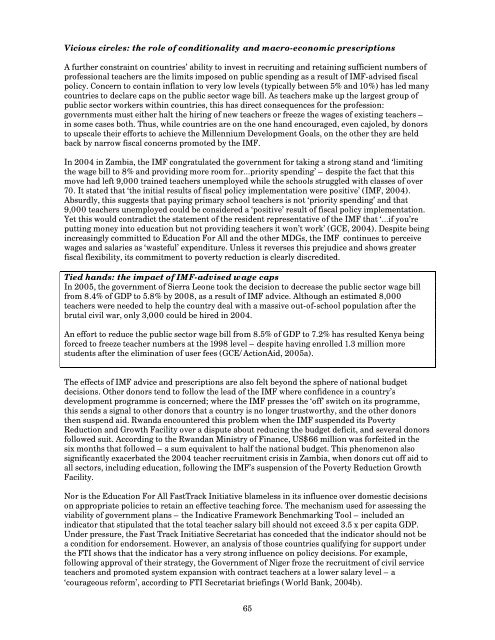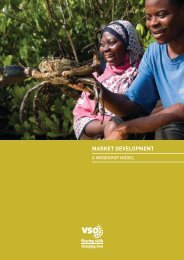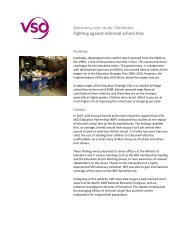Teachers for All â GCE policy briefing (566KB) - VSO
Teachers for All â GCE policy briefing (566KB) - VSO
Teachers for All â GCE policy briefing (566KB) - VSO
Create successful ePaper yourself
Turn your PDF publications into a flip-book with our unique Google optimized e-Paper software.
Vicious circles: the role of conditionality and macro-economic prescriptionsA further constraint on countries’ ability to invest in recruiting and retaining sufficient numbers ofprofessional teachers are the limits imposed on public spending as a result of IMF-advised fiscal<strong>policy</strong>. Concern to contain inflation to very low levels (typically between 5% and 10%) has led manycountries to declare caps on the public sector wage bill. As teachers make up the largest group ofpublic sector workers within countries, this has direct consequences <strong>for</strong> the profession:governments must either halt the hiring of new teachers or freeze the wages of existing teachers –in some cases both. Thus, while countries are on the one hand encouraged, even cajoled, by donorsto upscale their ef<strong>for</strong>ts to achieve the Millennium Development Goals, on the other they are heldback by narrow fiscal concerns promoted by the IMF.In 2004 in Zambia, the IMF congratulated the government <strong>for</strong> taking a strong stand and ‘limitingthe wage bill to 8% and providing more room <strong>for</strong>…priority spending’ – despite the fact that thismove had left 9,000 trained teachers unemployed while the schools struggled with classes of over70. It stated that ‘the initial results of fiscal <strong>policy</strong> implementation were positive’ (IMF, 2004).Absurdly, this suggests that paying primary school teachers is not ‘priority spending’ and that9,000 teachers unemployed could be considered a ‘positive’ result of fiscal <strong>policy</strong> implementation.Yet this would contradict the statement of the resident representative of the IMF that ‘…if you’reputting money into education but not providing teachers it won’t work’ (<strong>GCE</strong>, 2004). Despite beingincreasingly committed to Education For <strong>All</strong> and the other MDGs, the IMF continues to perceivewages and salaries as ‘wasteful’ expenditure. Unless it reverses this prejudice and shows greaterfiscal flexibility, its commitment to poverty reduction is clearly discredited.Tied hands: the impact of IMF-advised wage capsIn 2005, the government of Sierra Leone took the decision to decrease the public sector wage billfrom 8.4% of GDP to 5.8% by 2008, as a result of IMF advice. Although an estimated 8,000teachers were needed to help the country deal with a massive out-of-school population after thebrutal civil war, only 3,000 could be hired in 2004.An ef<strong>for</strong>t to reduce the public sector wage bill from 8.5% of GDP to 7.2% has resulted Kenya being<strong>for</strong>ced to freeze teacher numbers at the 1998 level – despite having enrolled 1.3 million morestudents after the elimination of user fees (<strong>GCE</strong>/ActionAid, 2005a).The effects of IMF advice and prescriptions are also felt beyond the sphere of national budgetdecisions. Other donors tend to follow the lead of the IMF where confidence in a country’sdevelopment programme is concerned; where the IMF presses the ‘off’ switch on its programme,this sends a signal to other donors that a country is no longer trustworthy, and the other donorsthen suspend aid. Rwanda encountered this problem when the IMF suspended its PovertyReduction and Growth Facility over a dispute about reducing the budget deficit, and several donorsfollowed suit. According to the Rwandan Ministry of Finance, US$66 million was <strong>for</strong>feited in thesix months that followed – a sum equivalent to half the national budget. This phenomenon alsosignificantly exacerbated the 2004 teacher recruitment crisis in Zambia, when donors cut off aid toall sectors, including education, following the IMF’s suspension of the Poverty Reduction GrowthFacility.Nor is the Education For <strong>All</strong> FastTrack Initiative blameless in its influence over domestic decisionson appropriate policies to retain an effective teaching <strong>for</strong>ce. The mechanism used <strong>for</strong> assessing theviability of government plans – the Indicative Framework Benchmarking Tool – included anindicator that stipulated that the total teacher salary bill should not exceed 3.5 x per capita GDP.Under pressure, the Fast Track Initiative Secretariat has conceded that the indicator should not bea condition <strong>for</strong> endorsement. However, an analysis of those countries qualifying <strong>for</strong> support underthe FTI shows that the indicator has a very strong influence on <strong>policy</strong> decisions. For example,following approval of their strategy, the Government of Niger froze the recruitment of civil serviceteachers and promoted system expansion with contract teachers at a lower salary level – a‘courageous re<strong>for</strong>m’, according to FTI Secretariat <strong>briefing</strong>s (World Bank, 2004b).65
















